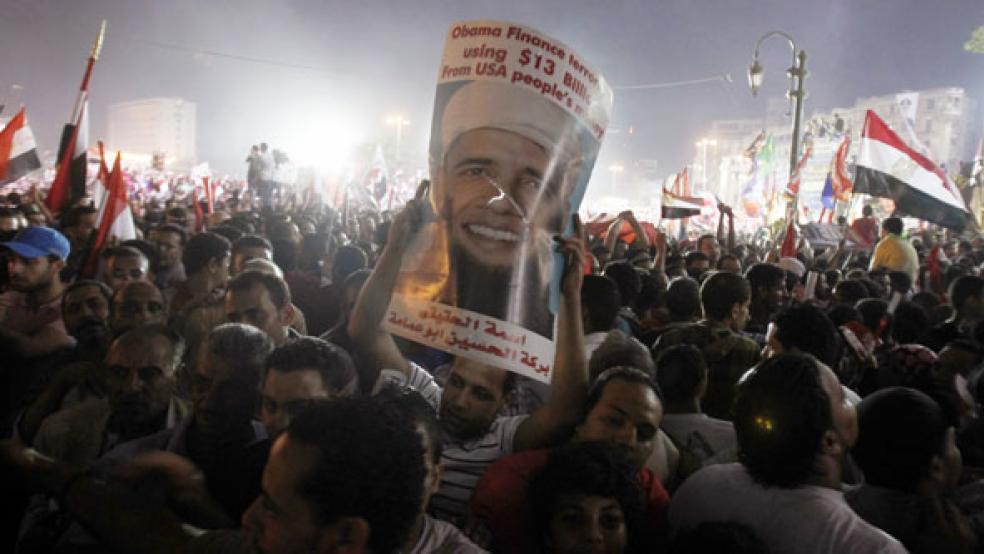Since President Obama took office in 2009, he has repeatedly said he has no interest in backing the kind of nascent democracies that were supported by George W. Bush’s administration.

“I’m not doing long-term nation-building,” he reportedly told former Defense Secretary Robert Gates and former Secretary of State Hillary Clinton in 2009. “I am not spending a trillion dollars.”
Obama indicated where he does want to spend America's resources this week when he told Jay Leno on “The Tonight Show” that the United States needed to invest in its infrastructure. It’s become one of the cornerstones of his presidency.
The focus on domestic issues has been especially evident in recent weeks. International crises and incidents have been breaking out around the world – especially in the Middle East. Yet because of the White House’s retreat from the global stage, Washington has been powerless to impact any of them.
RELATED: WHY THE U.S. IS CRASHING IN THE MIDDLE EAST
Lawrence Haas, senior fellow for U.S. Foreign Policy at the American Foreign Policy Council, says the president’s abdication of leadership on the global stage has weakened the standing of the United States while giving encouragement to U.S. enemies. It has particularly unsettled allies in the Middle East, a region where the United States has traditionally wielded heavy influence.
Republicans have long blasted the president for what they consider his feckless foreign policy. But now, even former Obama employees, including Anne-Marie Slaughter, Vali Nasr, and Rosa Brooks have joined the chorus.
“We have been very, very passive in the face of encouragement from our European and Middle East allies from playing a more forceful role and shaping events on the ground,” Haas told The Fiscal Times Thursday. “Each day our word becomes less trustworthy. Our allies’ reliance on us has been shaken and our adversaries’ fear of us has been reduced. That doesn’t serve U.S. interests in the long term or short term.”
ON THE SIDELINES
The number of international events that the Obama administration has been unable to shape grows longer by the day. In each of the following incidents, the White House has sat on the sideline, seemingly content to let others take the lead:
* Obama canceled a meeting with Vladimir Putin after the Russian president refused to hand over Edward Snowden. Obama and the State Department were unable to persuade Russia to detain Snowden, even after Attorney General Eric Holder met Russia’s conditions: He promised that the United States would not execute Snowden.
* Afghan President Harmid Karzai continues to openly defy the Americans, and has embarrassed the president and Defense Secretary Chuck Hagel with accusations that the United States is aiding the enemy.
* Iraq is continuing its descent into chaos. Last month, Al Qaeda orchestrated a jailbreak at Abu Ghraib prison that freed 250 militants. Some people have connected the escape with the lingering terror threat to Western targets in North Africa.
* Al Qaeda is reemerging across North Africa and the Arabian Peninsula, despite substantial U.S. efforts to halt the group’s return by using drone strikes and Special Forces.
STRATEGIC INTERESTS
According to Haas, the most damaging U.S. absence has been in the Middle East. The United States recently kick-started the peace process between Israel and the Palestinians, but this effort is largely seen as a last-ditch attempt to shape the region.
This effort is needed because the United States has little or no control over events happening elsewhere. For decades after World War II, American politicians and diplomats had a hand in shaping policy in the Middle East. But Obama has retreated from the region, Haas said.
The president has also failed to act when allies in the region longed for leadership. In Syria, Obama ignored his own red line and only acted when the tide of the civil war turned against the rebels. In Libya, Obama sat the U.S. military on the sidelines as the Gaddafi government was deposed. And the United States sits idly by while Egypt tinkers on the verge of collapse. U.S. friends in the region like Jordan and Saudi Arabia are now surrounded by chaos.
“He’s moving away from maintaining a rational U.S. presence in that region,” Haas said. “You see that in the turmoil that’s taking place and in our consistent silence or tardiness in our response. That region does not benefit in our absence. It tends to suffer.”





